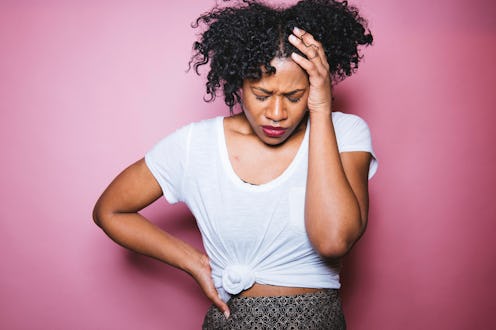
If you're one of 40 million people who suffer from anxiety, sometimes you might feel like your anxiety is making you sick. If you think your anxiety and stress is causing you physical illness, it's not all in your head. In addition to making you feel sick, hormones released when you experience anxiety can weaken your immune system, which means you are more likely to get a cold or the flu. According to Harvard's Women Health Watch from Harvard Medical School, "Evidence suggests that people with anxiety disorders are at greater risk for developing a number of chronic medical conditions."
The reason anxiety can trigger physical symptoms is because when you're anxious, your brain puts your body on alert, even if you're not actually in danger. "[Anxiety's] physical effects can be counterproductive, causing light-headedness, nausea, diarrhea, and frequent urination," Harvard Women's Health Watch reported. "And when it persists, anxiety can take a toll on our mental and physical health."
Personally, when I get anxious I have to pee 10 times more than I normally do, my neck and shoulders tense into a vice grip, and I feel consistently nauseous. While the physical effects of anxiety are real, Harvard noted that the study of anxiety manifesting in the body is still in its infancy, which means some doctors might not recognize connections between anxiety and physical illnesses.
The Connection Between Anxiety & Physical Illness
"Anxiety often goes unidentified as a source of other disorders, such as substance abuse or physical addiction, that can result from attempts to quell feelings of anxiety," Harvard Women's Health Watch explained. "And it's often overlooked in the myriad symptoms of chronic conditions like irritable bowel syndrome (IBS) or migraine headache [...] Anxiety has been implicated in several chronic physical illnesses, including heart disease, chronic respiratory disorders, and gastrointestinal conditions."
If you suffer from anxiety on the regular, then you know the struggle is real. And, sometimes, anxiety about getting a stomachache or a headache because you're feeling anxious can trap you in a cycle of anxiety that causes even more distress in your body. The Calm Clinic reported that because anxiety causes the release of the stress hormone cortisol in bulk all throughout your body, anxiety may even weaken your immune system, which, in addition to triggering chronic illnesses, can leave you more vulnerable to developing things like a cold or the flu.
"Cortisol weakens your immune system for a good reason. During periods of intense stress, as though you were about to face a predator, cortisol is trying to help reduce inflammation by weakening some of the antibodies that can increase inflammation," the Calm Clinic explained on its website. While you want your antibodies to take a break for the above reason, once the threat is over, you need them to get back to work ASAP. When that doesn't happen, your immune system takes a hit.
Anxiety Can Weaken Your Immune System
While in the short term the release of cortisol is helpful, in a long-term anxiety spiral is can leave you vulnerable. "When you experience prolonged stress, your body needs those T-cells and white blood cells, and unfortunately, cortisol continues to suppress them, thus weakening your immune system over time."
It's important to note that anxiety does not actually cause you to get sick, however, when your immune system is compromised you are likely to get sick more often, and it can take you longer to recover. If you feel like you're in a cycle of anxiety and illness, the first step to boosting your immune system is addressing your anxiety. The Calm Clinic recommends a few things that might make you feel less anxious while also strengthening your immune system, including exercise, staying hydrated, and massage.
If you deal with regular anxiety, the last thing you probably want is one more person giving you tips on how to manage your anxiety. I get it. Everyone is different, and just because running helped one person reduce anxiety does not mean it's going to work for you. Yoga is one thing that is suggested to me over and over again, but because I have chronic neck and shoulder pain from a childhood injury, yoga (except for aerial yoga and restorative yoga) actually hurts my body, which in turn causes me more anxiety about having more pain.
Reducing Anxiety Helps Your Body Stay Healthy
It's important to find something that works for you, and that might mean trying a lot of different things that don't work before you find something that does. Personally, meditation has helped me a lot, and when I don't meditate I can feel anxiety building up in my body. During cold and flu season, it's hard to stay well, and having a weakened immune system makes it much more difficult, so finding what works for you is an important step for staying healthy.
You need to stay hydrated anyways, so that one is a no brainer. Massage is also something that's pretty enjoyable, so go ahead and get one. You deserve it. You can also check out these expert tips for staying healthy during times of stress, like the holidays. Additionally, Harvard Medical School posted some proven relaxation techniques that can help reduce your anxiety. If you do end up getting sick, make sure you take care of yourself so you can increase your chances of recovering more quickly.
Anxiety can be a spiral that turns into a self-fulfilling prophecy when it's left unchecked. Anything you can do to safely stop your anxiety cycle can decrease your odds of weakening your immune system. And, remember, it's OK to ask for help. It really does take a village, and you are definitely not alone.